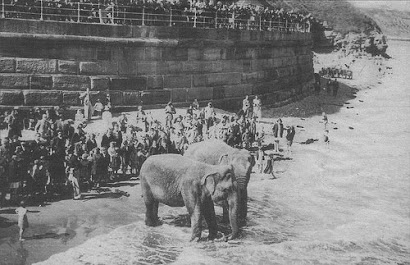BY RICHARD LOCKER

The Zillessen's guest house, Robin Hood's Bay
In 1970 a new family moved to Robin Hood’s Bay. Quietly assuming the role of guest house proprietor, Mr Zillessen settled down to enjoy semi-retirement and the gentle life the village offered. But this seemingly ordinary man harboured a secret, one which would have been known to millions of movie fans. He was in fact one of the brave prisoners responsible for organising the mass breakout at Stalag Luft III during the Second World War, an event immortalised in the 1963 movie The Great Escape.
Marcel Zillessen was born in Northampton in 1917 to a German father and Irish mother. His father, a successful businessman, would eventually relocate his family north to the small village of Eldwick, a move which enabled him to spend more time managing the family’s textile business in the nearby city of Bradford.
As a young man Marcel was given the position of Sales Director within the family business. To further his son’s education his father decided to send him to Berlin where he would study at the city’s university. It was during his stay in Berlin that Marcel became fluent in Berlinese, the language of the city’s high society. He would also witness first hand the rise of Hitler and National Socialism, an event that was to have a consolidating effect on the young man’s mind.
At the outbreak of war Marcel was approached by the British government with the intention of recruiting him as a spy, but Marcel declined claiming that subterfuge seemed to devious and that he wanted to confront the enemy ’face to face’.
Finally he opted to join the RAF where he became a Hurricane fighter pilot for number six squadron. Responsible for flying ’tank busting’ raids against Rommel’s Afrika Korps, Marcel was involved in numerous sorties, until eventually his luck ran out. On 6th April 1943 he was shot down and captured near Wadi Akarit in Tunisia.

A watch tower at Stalag Luft III
After been interrogated in Italy Marcel was transferred to the prisoner of war camp Stalag Luft III in Sangen, Germany. Upon his arrival he was indoctrinated into the camp’s ideology of the ‘duty of escape‘. The escape executive committee instantly saw the potential in Zillessen and put him to work liaising with the camp authority. The fact that he was know to have spent some time in the upper echelons of German society meant that the German officers in the camp tasked him with writing long, eloquent love letters home to their wives and girlfriends.
Once ingratiated with the camp authority Marcel set about procuring pens, ink and stationary, which were then put to use forging the necessary documents and passports needed for a successful escape.
The escape took place on the night of the 24th March 1944. In all two hundred men gathered in hut 104 and prepared themselves for the breakout.
This is Marcel Zillessen’s account of the occasion.
"Everything went wrong that night, there was an air raid and all the lights went out in the tunnel, and then a Major got stuck and it took ages to get him out.
I cannot describe what it was like when it finally broke. The German were absolutely livid, there were dogs rushing around the camp and guards were pouring in from all over the place.
There was still 150 PoWs left in the hut at the time we heard shots being fired. People came pouring down the tunnel telling everybody, ‘it’s all over‘.
Once I realised that the escape had broken I just leapt out of the hut. I ran as fast as I could and jumped through the window into my own room."

An ariel photograph of Stalag Luft III. The exit of one of the escape tunnels can be seen as a light area outside the perimeter fence indicated by an arrow.
Of the 76 men that escaped that night, only 3 managed to make it back to the UK, 23 were re-captured and returned to camp and the rest, fifty men in all, were executed by the Gestapo.
After the war Marcel returned to the family business in Bradford. In 1951 he married his Bradford born wife Lyn. Later moving to Darlington, Co Durham he became involved in the wool trade. Whilst in the North-East Marcel also set up a chain of fast food outlets using the Zillessen name.
After leading this extraordinary life Marcel finally settled in Robin Hood’s Bay where he unassumingly spent the next thirty years of his life quietly running a guest house. Marcel Zillessen died on the 8th January 1999 aged 81.

Henley The Scrounger, James Garner's character in the 1963 film The Great Escape was based on Marcel Zillessen.
Links:



No comments:
Post a Comment